Conversation Piece:
Soprano PATRICIA RACETTE
By Bruce Duffie
The American soprano Patricia Racette is making a name for
herself
in this country and in Europe. Singing on both coasts (the
Metropolitan
in New York and in San Francisco) as well as in between (Houston and
Chicago),
she brings her versatility to a number of roles including Violetta and
Mimi, plus lesser-known ones such as Ellen Orford and Jenufa, and even
brand new operas including works by Carlisle Floyd, and Tobias Picker,
whose title character in the opera Emmeline has been seen on
PBS
and is available on CD in the Albany recording.
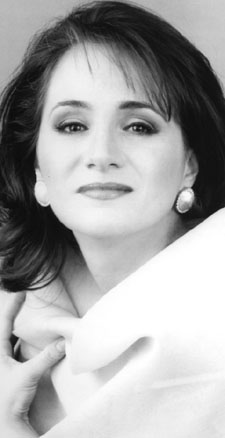 Racette
has also appeared in leading roles at Covent Garden, Paris, Vienna,
Geneva,
and in Japan with Seiji Ozawa. During November and December of
2000,
she brought the Janacek heroine to Chicago, and during that time, I had
the pleasure of spending an hour with her between performances.
Her
enthusiasm was apparent during our entire chat, and she was thoughtful
about her ideas and careful to give specific advice.
Racette
has also appeared in leading roles at Covent Garden, Paris, Vienna,
Geneva,
and in Japan with Seiji Ozawa. During November and December of
2000,
she brought the Janacek heroine to Chicago, and during that time, I had
the pleasure of spending an hour with her between performances.
Her
enthusiasm was apparent during our entire chat, and she was thoughtful
about her ideas and careful to give specific advice.
About her own career, she told me that she records her own
voice
lessons in order to capture the sound and instruction for future
reference.
We pick up the conversation at that point...
Bruce Duffie: Do you continue to learn from a tape
that you
made a week, a month, a year or a decade ago?
Patricia Racette: Yes, I do. It's always very
interesting
to mark one's progress or one's new challenges by taking out an old
tape
and saying, "Wait a second. That little spot used to be a lot easier
for
me." I usually mark on the outside of the tape what I may or may
not have achieved or what challenge I address in that voice lesson. So
it's actually very interesting.
BD: Is there ever going to be a time when you're
marking "decline?"
(Both laugh)
PR: No. (both laugh) Whatever could you be talking
about?
(Laughs)
BD: I assume you make progress each time you study
the role
and each time you come to a role again. Do you make progress from
performance
to performance of the same role?
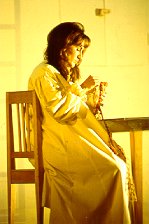 PR:
Yes. Progress, though, is a funny word. Performing art is a living,
spiritual
thing, and when one is performing a role as rich as Jenufa, or as rich
and demanding as Violetta in Traviata, it's inevitable that
things
are going to change. Do they always change for the better? No. They'll
fluctuate just like anything else. It's a good day/bad day type of
thing.
Sometimes you'll go in there and not be even remotely in the mood to
perform,
and it will be one of the best nights you could possibly have. And
sometimes
you'll go in there and gear it up for your opening night or whatever
and this is going to be on fire, this is going to be electrifying, and
it may not necessarily be that way. The beauty and the curse of it is
that
you don't really have control over that magical aspect of music.
PR:
Yes. Progress, though, is a funny word. Performing art is a living,
spiritual
thing, and when one is performing a role as rich as Jenufa, or as rich
and demanding as Violetta in Traviata, it's inevitable that
things
are going to change. Do they always change for the better? No. They'll
fluctuate just like anything else. It's a good day/bad day type of
thing.
Sometimes you'll go in there and not be even remotely in the mood to
perform,
and it will be one of the best nights you could possibly have. And
sometimes
you'll go in there and gear it up for your opening night or whatever
and this is going to be on fire, this is going to be electrifying, and
it may not necessarily be that way. The beauty and the curse of it is
that
you don't really have control over that magical aspect of music.
BD: Do you have any control at all or is it partly
under the
control of the other singers and the conductor in the pit and the stage
director?
PR: It's up to the individual singer. It's really
been a revelation
to me because I've noticed the individual singer has very little
control,
and the responsibility is very, very great. There's a bit of unfairness
in all that. I have control over warming up properly. I don't
have
control over how I may feel that day other than taking care of myself
and
being sure I'm as healthy as I can possibly be. But warming up,
concentrating,
eating properly – that is about as much as control as I can imagine.
You
go out there and you perform. You can't control the audience. You can't
control the traffic jam that may have happened on their way. You can't
control the kind of day that they had. If people are not in the mood,
it's
very interesting how this feeling can come across en masse. Sometimes
I'll
get out there and I'll be singing and I'll get off stage for the
intermission
and I'll say to a colleague, "Boy, does that audience seem far away or
what?"
BD: Everybody feels it?
PR: Yes, in some way. And it's really remarkable
because it
couldn't be less tangible.
BD: Do you then fight against it or do you just have
to go
with it?
PR: I think if I were giving advice to a group of
young singers,
I'd say, do not fight against it. Go with it. But the temptation is
very
strong to fight against it. The temptation is very strong to say, "Hey,
listen, be prepared to move, be prepared to cry, let me move you." You
can
sometimes go out of your artistic sphere and do that and I think that
can
be a mistake because you can't control so many factors.
BD: Have there been times when you've won over an
audience?
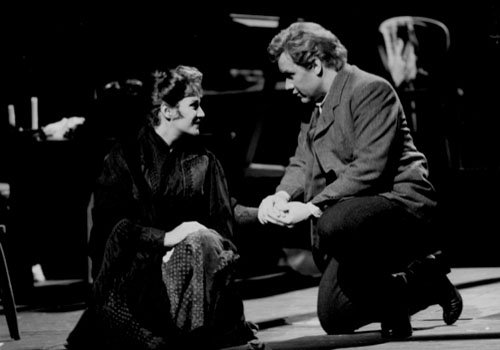
Racette with Richard Leech in La Bohème
PR: Yes, but don't ask me how. These things
sort of
creep up on you. There are times when I thought I was vocally feeling
under
the weather and struggled a bit through a performance and received
reports
afterwards saying I've never been like this. I have to keep my
mouth
shut and say, "Oh, thank you, thank you." HOW DOES THIS HAPPEN???
I'm very aware, of course, of my own performance. At the same time
being
lost in it, I'm also aware of it. It's a very, very interesting
balance,
and a very strange balance. It's an ongoing process learning how to
deal
with that balance, and every individual is different. I approach
everything
with a great deal of thought and some people are purely instinctive in
how they approach things, yet they often are very effective artists. I
think each artist has a different combination of the instinctive
qualities
and the very intentional mental aspect to it. I try to balance both.
BD: When you walk on stage, are you still portraying
a character
or do you actually become that character?
PR: The goal is to become that character, to live
that situation
and live that life as though it were truly happening in a spontaneous
way.
The tricky thing or the "unrealistic" thing is that we don't go through
our lives singing! Often, the sung word and the sung sentence is
expanded
over a lot longer period of time. But that is what is interesting - to
make it second nature so that you are living and becoming something
else.
You've become an artist. It's a very complex balance that keeps
coming
back to me in every lesson, every new production, every performance.
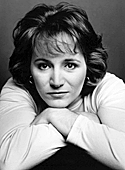 BD:
And it's a different balance each night?
BD:
And it's a different balance each night?
PR: So different and so complex, yet simple in its
broad strokes.
BD: Can I assume that there are lots of different
‘right balances'
so there would be no night that would be THE RIGHT ONE?
PR: Absolutely. Absolutely. Pitch and rhythm
are pretty
clear so those can be right or wrong. But in terms of interpretive
factors
and the way in which an artist will color a word, the way in which an
artist
will move, the expression that will be chosen for that moment, there is
no right or wrong. It's so subjective. What you may find effective, the
person next to you might be snoring. You really can't control that and
you can't allow yourself to be concerned with that. You have to be IN
it
enough. You have to be separated yet so immersed in it to be just doing
it. Allow others to look upon it. Share it with them and then you have
to walk away and detach from it.
BD: Well, you obviously have some responsibility
toward the
performance, but then is most of the responsibility on the shoulders of
the composer and the librettist?
PR: I would say so. It's the structure you're working
in.
It's not an improvisation. In straight theater you have timing that you
have control over in because you don't necessarily have a music cue to
deal with. In opera, the timing is decided upon primarily by the
composer,
but then by the conductor and how he will choose to pace the piece, so
we have to fit the interpretation into that timing. There are other
musical
indications that will decide. I'll read through a libretto and then
I'll
be surprised sometimes that he marked this piano. I would have thought
this would have been another kind of expression. It opens up a
new
window into what that composer wanted. So there's very much a blueprint
by which we all must work and it is our responsibilities as artists to
remain very flexible.
BD: Are there any of these characters that you
portray that
are perhaps a little too close to the real Patricia?
PR: Yes. Not in their circumstance. Nothing that
obvious,
but somehow in their expression, in the pain that the characters have
experienced
ends up, for some reason, being very cathartic and, as you say, very
close
to the real Patricia. This one, Jenufa, would be very much among that,
actually. Also Emmeline I did with Santa Fe Opera.
* *
*
* *
 BD:
Let's talk a little bit about the character that you're portraying here
in Chicago–Jenufa. Tell me a bit about her. What should we know before
coming to the performance, or is that all presented to us on the stage
through your interpretation?
BD:
Let's talk a little bit about the character that you're portraying here
in Chicago–Jenufa. Tell me a bit about her. What should we know before
coming to the performance, or is that all presented to us on the stage
through your interpretation?
PR: She's a joy to know. I do think it is all
presented,
frankly. This is a brilliant production. The reception was certainly
very
enthusiastic. It tells the story honestly and potently and I don't
think
it leaves too many things open. You're not left with a question about
what
it meant, but it's not set out so predictably that you can bet what's
going
to happen. There are elements of surprise that remain in the piece. But
it is very, very accessible.
BD: Did Janacek write well for the voice?
PR: Yes, very well. I'm very happy singing this.
Sometimes
you'll do a role that is dramatically interesting, as Jenufa is,
but vocally you'll think it's a little boring or it's a little
punishing.
This is just exquisite to sing so it's a treat.
BD: How about the Czech language with all its
consonants?
PR: Yes, with all its consonants, and sometimes
without a
vowel in sight. I love singing in Czech. This is my first
experience
and I find it really an interesting challenge. Despite all the
consonants,
it has a softening sort of approach into the vocalism. In fact, I'm
going
to be taking on another Czech piece in a few years–Katia Kabanova which
I am very excited about.
BD: I was just going to ask you if Amelia Marti or
Katia were
in your future?
PR: I think Amelia might wait a little bit, but
Katia, most
definitely.
BD: Do you change your technique at all for the size
of the
house – a great big house like we have here or a very small intimate
house?
PR: No. Never.
BD: Not a bit?
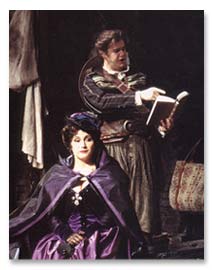 PR:
No. My technique remains absolutely as is. My feeling about singing in
a certain size house is that that is a discussion and a consideration
which
needs to happen at the time of hiring. I will bring what I can bring,
and
if it isn't sufficient in terms of the challenge, of pure volume and
all
that, it's not something that is wise to rectify with your technique.
You
sing the way you sing and you sing well and you produce the amount of
sound
you produce. I come to the table with my voice and my technique and
offer
my strengths and work on my challenges for whatever role I'm doing.
PR:
No. My technique remains absolutely as is. My feeling about singing in
a certain size house is that that is a discussion and a consideration
which
needs to happen at the time of hiring. I will bring what I can bring,
and
if it isn't sufficient in terms of the challenge, of pure volume and
all
that, it's not something that is wise to rectify with your technique.
You
sing the way you sing and you sing well and you produce the amount of
sound
you produce. I come to the table with my voice and my technique and
offer
my strengths and work on my challenges for whatever role I'm doing.
BD: Does it ever surprise you what kinds of roles or
what
specific roles you are offered?
PR: Yes, it does. But I have to say, when I was
offered this
Jenufa, I was not sure about the role at all. I trusted the people that
hired me. I said OK, but within myself, I didn't know. But
I've been calling myself an idiot for several months now, because this
role is actually PERFECT for me.
BD: Well, it might not have been perfect for you 2 or
3 years
ago when it was offered.
PR: Perhaps not. Perhaps not. But that's a scary game
too.
You can't really forecast that. But this role is completely comfortable
for me in every aspect.
BD: Does this mean that the people who saw potential
in your
voice then might know what your voice can do 2 or 3 years hence?
PR: Oh, I've got meetings set up. Absolutely. I need
to pick
their brains on some repertoire. Because it is difficult, as much as
one
may try, I do try and assess. As I said, I tape my voice lessons. I try
and assess for myself what I'm hearing. But it's always good to get an
idea of what is being seen outside of oneself and what is being heard
in
their opinion.
BD: You need that other set of ears out there.
PR: Yeah.
BD: How easy is it to say "no?"
PR: Oh, it hurts sometimes and sometimes it's
difficult.
I will always do it diplomatically, but sometimes you worry if you're
burning a bridge. But it's more important to stick by your guns
and
do what you think is right, even if it turns out to be a mistake. Risk
is well worth taking if it's well thought out.
BD: So your career is getting more and more
complicated?
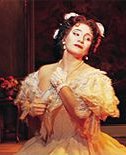 PR:
Yes, in some ways. I'm at a very exciting point right now where
I'm
trying a lot of different repertoire. The first consideration for me is
always vocal and I am blessed with a voice and technique that is able
to
do a lot of varied repertoire. I'm going to take advantage of
that
as I experiment to see which direction best suits me. I'm
choosing
roles primarily on how they interest me artistically and vocally.
PR:
Yes, in some ways. I'm at a very exciting point right now where
I'm
trying a lot of different repertoire. The first consideration for me is
always vocal and I am blessed with a voice and technique that is able
to
do a lot of varied repertoire. I'm going to take advantage of
that
as I experiment to see which direction best suits me. I'm
choosing
roles primarily on how they interest me artistically and vocally.
BD: Do you get enough time to study the new roles and
prepare?
PR: Oh, I make sure I take time for that. In
fact, I
kept January absolutely free to be in New York and study and coach and
just really have that important secluded artistic time to get the work
I need to get done. It's no fun cramming and when I have an
opportunity
to work at such a wonderfully high level, I really want to be able to
come
and not just rise to the occasion, but bring something of my own into
that
realm. That takes a great deal of effort.
BD: I assume it is better working with higher level
colleagues.
PR: Oh sure. I love it when you can learn from the
people
around you. I love that. And I love it when you can be wowed by the
people
around you. It's very exciting.
BD: Do you like being booked 2, 3. 4 years in advance?
PR: Well, certainly. There is no job security in my
profession
so that's all we have. It's a little weird to know where I'm
going
to be in April of 2003 or whatever. That's a little odd.
* *
*
* *
BD: How do you divide your career between opera and
concert?
PR: I do mostly opera. However, I very much want to
do more
concerts and recitals, so that's something I'm slowly but surely trying
to work into.
BD: Do you let your agent know that's what you're
looking
for?
PR: We're very much working towards that, yes. It's
important
for an artistic balance because in concert, you're going out as you and
performing as yourself. In opera, you can really hide behind some
of the characters and I think it's always important to keep your own
artistry
and your own self in the picture.
BD: Do you like doing song literature?
PR: I do. I have not done that much so it's something
that
the time off aspect that we were talking about. It's something I'd like
to spend time and explore.
BD: Now, you've done Emmeline by Tobias
Picker. Have
you done any other new pieces?
PR: Last spring I did The Cold Sassy Tree by
Carlisle
Floyd in Houston. That was really a wonderful experience.
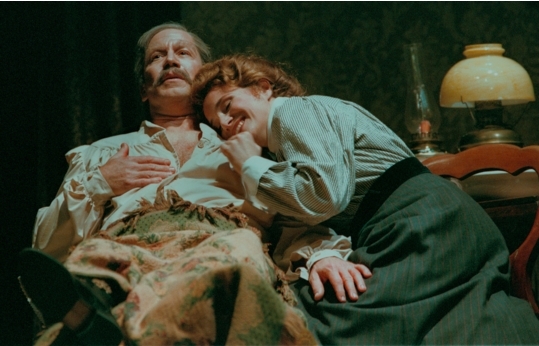
Racette with Dean Peterson in The Cold Sassy
Tree
BD: He writes wonderfully for the voice.
PR: Yes, and it's a very ambitious vocal score too.
He has
a wonderful knack for drama and comedy and tragedy. It's a wonderful
piece.
It was a huge success. The audience just loved it. So I think and hope
it will be an important part of the American repertoire.
BD: What advice do you have for composers who want to
write
for the voice these days as we head into the new millennium?
PR: A lot of composers are more sensitive to the
natural limitations
of the voice. I remember reading something in the New York Times maybe
5 years ago about a composer's workshop and there were several
composers
that were mentioning and sharing the fact that they really didn't know
the voice at all, yet they were writing for the voice. That's very
frightening.
You can buy a new trumpet and with great expense, you can buy a new
violin.
But you can't buy a new voice. If a singer misjudges and ends up having
harmed oneself, that's a high price to pay.
BD: Would you want to be able to go down to the voice
store
and put in a new part or two?
PR: No. No. The imperfections of the voice and why
it's different
with respect to every instrumentalist out there is what we have to
offer
artistically. So my advice to the composers would be talk to a lot of
singers.
BD: Talk or listen?
PR: Talk and listen, but talk. I love it when a
composer will
speak with me. I'll tell them if the approach is like this, it is
heaven
for me. But if the approach is like this and on that vowel, it's just
very,
very difficult. That sort of specific input, whether or not they heed
it,
that's entirely their option, but to have that information is always
good.
Some of the approaches Janacek used to the high notes are just
tailor-made
for me. I couldn't ask for it to be easier. But that's for me. What
about
the next person? Maybe it wouldn't be the same thing. So it's important
to get a lot of information.
BD: What about the composer that says, "This singer
says do
such and such and this other singer says do exactly the opposite?"
PR: My question would be what kind of color do you
want to
hear there? What kind of person is this? What age person is this? What
kind of voice type can you envision? I'm sure this would make some
composers
very angry, but they could compare the role they're creating to some
repertoire
that already exists. That kind of voice might be fitting. While there
are
some really interesting, unique singers out there, a lyric soprano will
embody this kind of a range and maybe the tessitura most comfortable
here.
It's tessitura that I think is not being paid attention to the most in
a lot of new pieces.
* *
*
* *
BD: Let me ask the easy question: What's the purpose
of music?
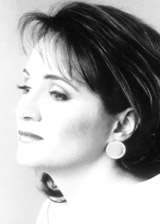 PR:
Oh my goodness! To remind us that we are all human and
essentially
the same. I'm not going to sit here and list the world's tensions and
tragedies,
but that is one thing which seems to unite and seems to ride over more
than anything else I can think of. When the earthquake happened in 1989
in San Francisco, I was an Adler Fellow in the Opera Center. I was
doing
the high priestess in "Aida" but the building was damaged, so we had to
go to the Masonic Auditorium. There was an energy in that place. It was
a terrible event, but it was not something that devastated the entire
city.
It devastated a lot of things, but the response, the need to be moved,
to experience something beautiful and something pure just by its very
essence,
was so overwhelming. We were all in tears, really. It was very, very
noticeable.
If there's anything that will make you just feel small and human and
dispensable
is an earthquake.
PR:
Oh my goodness! To remind us that we are all human and
essentially
the same. I'm not going to sit here and list the world's tensions and
tragedies,
but that is one thing which seems to unite and seems to ride over more
than anything else I can think of. When the earthquake happened in 1989
in San Francisco, I was an Adler Fellow in the Opera Center. I was
doing
the high priestess in "Aida" but the building was damaged, so we had to
go to the Masonic Auditorium. There was an energy in that place. It was
a terrible event, but it was not something that devastated the entire
city.
It devastated a lot of things, but the response, the need to be moved,
to experience something beautiful and something pure just by its very
essence,
was so overwhelming. We were all in tears, really. It was very, very
noticeable.
If there's anything that will make you just feel small and human and
dispensable
is an earthquake.
BD: Reminds you that life is transitory.
PR: Exactly. But music endures.
* * * * * * * * * * * * *
Bruce Duffie worked at WNIB, Classical 97 in Chicago for over 25
years, until the station was sold and changed format in February of
2001.
- - - - -
= = = = = = =
- - - - -
©2000 Bruce Duffie
First published in The Opera Journal, March, 2001.
Photos added for this website posting, including (besides those
with
labels) Jenufa at Lyric Opera of Chicago, Violetta, and with Thomas
Barrett
in Don Giovanni.
Visit Bruce Duffie's Personal
Website [ http://www.bruceduffie.com ]
 Racette
has also appeared in leading roles at Covent Garden, Paris, Vienna,
Geneva,
and in Japan with Seiji Ozawa. During November and December of
2000,
she brought the Janacek heroine to Chicago, and during that time, I had
the pleasure of spending an hour with her between performances.
Her
enthusiasm was apparent during our entire chat, and she was thoughtful
about her ideas and careful to give specific advice.
Racette
has also appeared in leading roles at Covent Garden, Paris, Vienna,
Geneva,
and in Japan with Seiji Ozawa. During November and December of
2000,
she brought the Janacek heroine to Chicago, and during that time, I had
the pleasure of spending an hour with her between performances.
Her
enthusiasm was apparent during our entire chat, and she was thoughtful
about her ideas and careful to give specific advice.
 PR:
Yes. Progress, though, is a funny word. Performing art is a living,
spiritual
thing, and when one is performing a role as rich as Jenufa, or as rich
and demanding as Violetta in Traviata, it's inevitable that
things
are going to change. Do they always change for the better? No. They'll
fluctuate just like anything else. It's a good day/bad day type of
thing.
Sometimes you'll go in there and not be even remotely in the mood to
perform,
and it will be one of the best nights you could possibly have. And
sometimes
you'll go in there and gear it up for your opening night or whatever
and this is going to be on fire, this is going to be electrifying, and
it may not necessarily be that way. The beauty and the curse of it is
that
you don't really have control over that magical aspect of music.
PR:
Yes. Progress, though, is a funny word. Performing art is a living,
spiritual
thing, and when one is performing a role as rich as Jenufa, or as rich
and demanding as Violetta in Traviata, it's inevitable that
things
are going to change. Do they always change for the better? No. They'll
fluctuate just like anything else. It's a good day/bad day type of
thing.
Sometimes you'll go in there and not be even remotely in the mood to
perform,
and it will be one of the best nights you could possibly have. And
sometimes
you'll go in there and gear it up for your opening night or whatever
and this is going to be on fire, this is going to be electrifying, and
it may not necessarily be that way. The beauty and the curse of it is
that
you don't really have control over that magical aspect of music.

 BD:
And it's a different balance each night?
BD:
And it's a different balance each night?
 BD:
Let's talk a little bit about the character that you're portraying here
in Chicago–Jenufa. Tell me a bit about her. What should we know before
coming to the performance, or is that all presented to us on the stage
through your interpretation?
BD:
Let's talk a little bit about the character that you're portraying here
in Chicago–Jenufa. Tell me a bit about her. What should we know before
coming to the performance, or is that all presented to us on the stage
through your interpretation?
 PR:
No. My technique remains absolutely as is. My feeling about singing in
a certain size house is that that is a discussion and a consideration
which
needs to happen at the time of hiring. I will bring what I can bring,
and
if it isn't sufficient in terms of the challenge, of pure volume and
all
that, it's not something that is wise to rectify with your technique.
You
sing the way you sing and you sing well and you produce the amount of
sound
you produce. I come to the table with my voice and my technique and
offer
my strengths and work on my challenges for whatever role I'm doing.
PR:
No. My technique remains absolutely as is. My feeling about singing in
a certain size house is that that is a discussion and a consideration
which
needs to happen at the time of hiring. I will bring what I can bring,
and
if it isn't sufficient in terms of the challenge, of pure volume and
all
that, it's not something that is wise to rectify with your technique.
You
sing the way you sing and you sing well and you produce the amount of
sound
you produce. I come to the table with my voice and my technique and
offer
my strengths and work on my challenges for whatever role I'm doing.
 PR:
Yes, in some ways. I'm at a very exciting point right now where
I'm
trying a lot of different repertoire. The first consideration for me is
always vocal and I am blessed with a voice and technique that is able
to
do a lot of varied repertoire. I'm going to take advantage of
that
as I experiment to see which direction best suits me. I'm
choosing
roles primarily on how they interest me artistically and vocally.
PR:
Yes, in some ways. I'm at a very exciting point right now where
I'm
trying a lot of different repertoire. The first consideration for me is
always vocal and I am blessed with a voice and technique that is able
to
do a lot of varied repertoire. I'm going to take advantage of
that
as I experiment to see which direction best suits me. I'm
choosing
roles primarily on how they interest me artistically and vocally.

 PR:
Oh my goodness! To remind us that we are all human and
essentially
the same. I'm not going to sit here and list the world's tensions and
tragedies,
but that is one thing which seems to unite and seems to ride over more
than anything else I can think of. When the earthquake happened in 1989
in San Francisco, I was an Adler Fellow in the Opera Center. I was
doing
the high priestess in "Aida" but the building was damaged, so we had to
go to the Masonic Auditorium. There was an energy in that place. It was
a terrible event, but it was not something that devastated the entire
city.
It devastated a lot of things, but the response, the need to be moved,
to experience something beautiful and something pure just by its very
essence,
was so overwhelming. We were all in tears, really. It was very, very
noticeable.
If there's anything that will make you just feel small and human and
dispensable
is an earthquake.
PR:
Oh my goodness! To remind us that we are all human and
essentially
the same. I'm not going to sit here and list the world's tensions and
tragedies,
but that is one thing which seems to unite and seems to ride over more
than anything else I can think of. When the earthquake happened in 1989
in San Francisco, I was an Adler Fellow in the Opera Center. I was
doing
the high priestess in "Aida" but the building was damaged, so we had to
go to the Masonic Auditorium. There was an energy in that place. It was
a terrible event, but it was not something that devastated the entire
city.
It devastated a lot of things, but the response, the need to be moved,
to experience something beautiful and something pure just by its very
essence,
was so overwhelming. We were all in tears, really. It was very, very
noticeable.
If there's anything that will make you just feel small and human and
dispensable
is an earthquake.